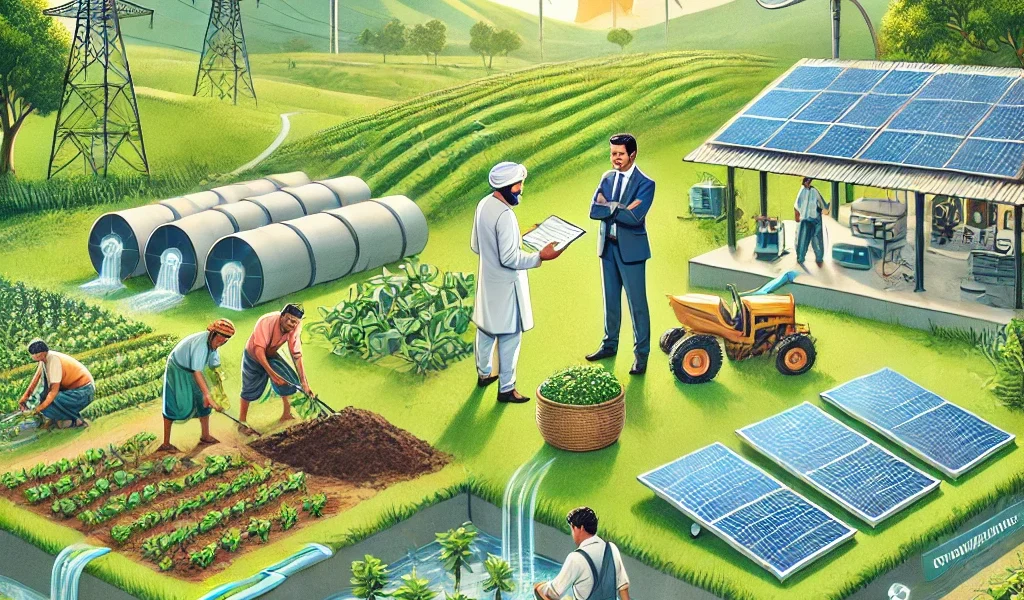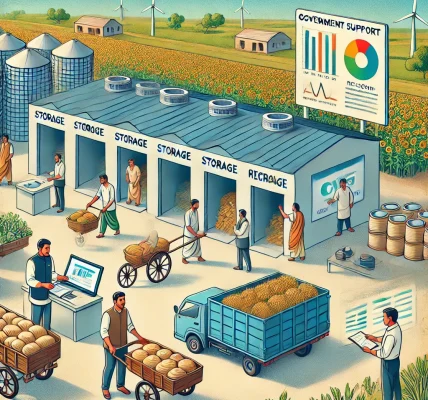Introduction
Climate change is posing significant challenges to agriculture, impacting crop productivity, soil health, and water availability. Small and marginal farmers are particularly vulnerable to erratic rainfall, droughts, floods, and rising temperatures. To address these challenges, the Indian government has introduced various schemes and initiatives to promote climate-resilient farming.
In this blog, we will explore how government-backed schemes support sustainable agriculture, helping farmers mitigate climate risks while increasing productivity.
Understanding Climate-Resilient Farming
Climate-resilient farming refers to agricultural practices that help farmers adapt to climate change while ensuring long-term sustainability. It includes:
- Efficient water management (e.g., micro-irrigation, rainwater harvesting).
- Soil conservation and organic farming to maintain fertility.
- Use of climate-resistant crop varieties.
- Agroforestry and biodiversity conservation.
- Sustainable pest and disease management.
Why Is Climate-Resilient Farming Important?
- Reduces dependency on erratic weather conditions.
- Minimizes crop losses due to climate extremes.
- Enhances soil fertility and water conservation.
- Improves farmer incomes through sustainable agricultural practices.
Key Government Schemes Promoting Climate-Resilient Farming
1. Pradhan Mantri Krishi Sinchayee Yojana (PMKSY)
PMKSY aims to improve irrigation efficiency and promote water conservation in agriculture.
Benefits for Farmers:
- Financial assistance for drip irrigation and sprinkler systems.
- Watershed management programs to improve groundwater levels.
- Encouragement of rainwater harvesting and micro-irrigation.
How to Avail This Scheme?
- Farmers can apply through State Agriculture Departments or NABARD.
- Subsidies cover 40%-55% of irrigation system costs, depending on category.
2. National Adaptation Fund for Climate Change (NAFCC)
NAFCC provides financial support to farmers for climate adaptation projects.
Benefits for Farmers:
- Assistance in developing climate-resilient crop varieties.
- Promotion of sustainable land and water management.
- Funds for alternative livelihood programs for affected farmers.
How to Avail This Scheme?
- Farmers can approach State Agricultural Universities or KVKs (Krishi Vigyan Kendras) for project details.
- The scheme is implemented through state governments and NGOs.
3. Paramparagat Krishi Vikas Yojana (PKVY)
PKVY supports organic and natural farming, reducing dependency on chemical inputs that harm the environment.
Benefits for Farmers:
- Financial aid for organic farming certification.
- Training and subsidized inputs for organic cultivation.
- Better market access for organic produce.
How to Avail This Scheme?
- Farmers can apply through State Agricultural Departments.
- Group certification is encouraged through Farmer Producer Organizations (FPOs).
4. Rashtriya Krishi Vikas Yojana (RKVY)
RKVY funds various climate-smart agricultural projects, including agroforestry and watershed development.
Benefits for Farmers:
- Support for climate-resilient infrastructure.
- Training programs on integrated farming systems.
- Assistance for setting up solar pumps and renewable energy solutions.
How to Avail This Scheme?
- Farmers need to contact State Agriculture Departments.
- Funds are allocated through District Agricultural Offices.
5. Soil Health Management (SHM) Scheme
SHM focuses on improving soil fertility through organic and balanced nutrient management.
Benefits for Farmers:
- Subsidies for soil testing and health cards.
- Training on bio-fertilizers and composting techniques.
- Assistance for soil conservation measures.
How to Avail This Scheme?
- Farmers can visit local Krishi Vigyan Kendras for soil testing.
- Applications can be submitted through State Agriculture Offices.
Additional Climate-Resilient Farming Practices Supported by Government Initiatives
1. Agroforestry and Mixed Cropping
- Promoted under National Agroforestry Policy.
- Encourages tree plantation along with crops to reduce soil erosion and increase biodiversity.
2. Climate-Resistant Crop Varieties
- ICAR and State Agricultural Universities provide hybrid and climate-resistant seeds.
- Farmers can apply for subsidized seeds through agricultural extension centers.
3. Renewable Energy in Farming
- The government supports solar-powered irrigation pumps under PM-KUSUM scheme.
- Subsidies of up to 60% are available for installing solar panels on farms.
4. Integrated Pest and Disease Management (IPM)
- The National Mission on Sustainable Agriculture (NMSA) provides support for IPM.
- Encourages biopesticides, neem-based sprays, and eco-friendly pest control.
Challenges in Implementing Climate-Resilient Farming
Despite government support, farmers face hurdles in adopting climate-smart practices:
- Lack of awareness about available schemes.
- High initial costs for transitioning to sustainable methods.
- Limited access to training and knowledge-sharing programs.
- Climate change uncertainties affecting decision-making.
Solutions to Overcome These Challenges
- Strengthening outreach programs through Farmer Producer Organizations (FPOs).
- Simplifying loan and subsidy applications for farmers.
- Encouraging digital tools (such as weather-based advisory services) to help farmers make informed decisions.
Conclusion
Climate-resilient farming is crucial for the future of Indian agriculture. The government has launched multiple schemes to support farmers in adapting to climate change and ensuring sustainable productivity. By leveraging PMKSY, NAFCC, PKVY, and other programs, farmers can secure their livelihoods against climate-related risks.




